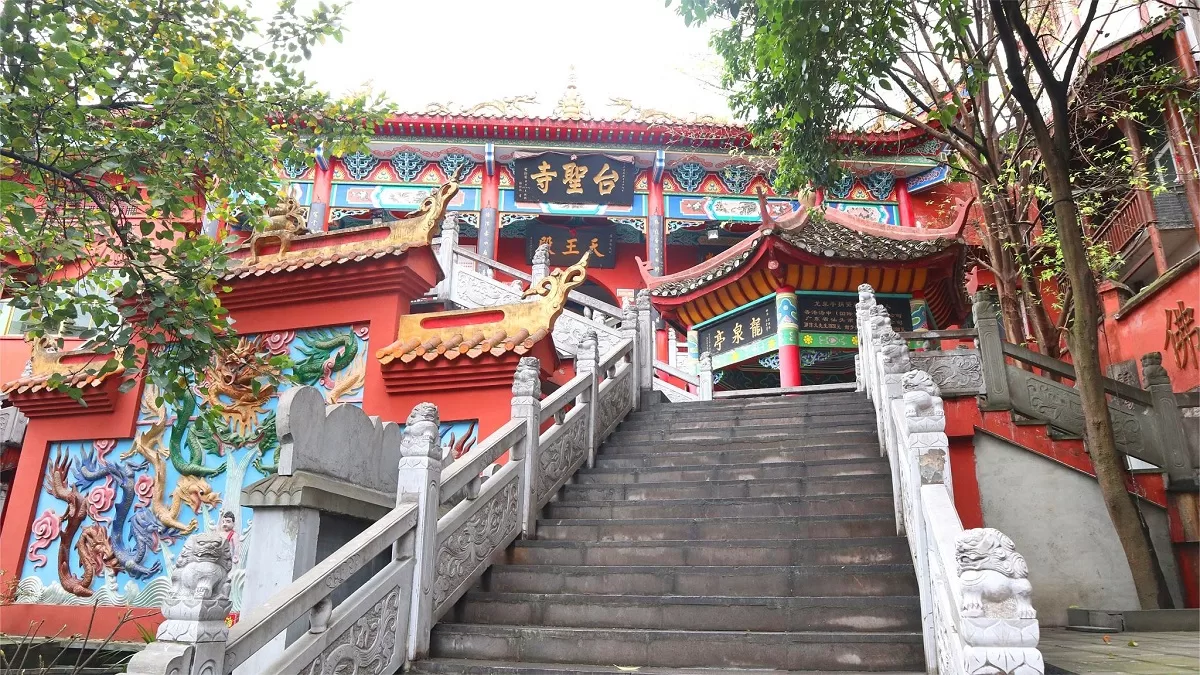Hongfu Temple (弘福寺) is situated atop the Qianling Mountain in Guiyang, founded by Monk Chisong in 1672 and often referred to as the “First Monastery of Guizhou.” The name “Hongfu” signifies the grand vow to propagate Buddhism, save beings, and bring blessings to all, emphasizing the virtuous beginning and end.
Despite its moderate size, Hongfu Temple boasts a well-organized layout and dignified architecture, blending harmoniously with the lush green surroundings, radiating an ancient charm. The temple is famous for its efficacious prayers, attracting a vibrant congregation.
Within the temple grounds, various ancient relics can be explored, such as the Nine-Bend Path opened by Monk Chisong, engraved rock carvings, ancient Buddha caves visited by the renowned traveler Xu Xiake, and a historical stupa forest housing relics of monks from different eras. The temple’s bell tower houses a 1500-kilogram bronze bell, cast in the fifth year of the Ming Dynasty’s Chenghua era (1469), originally located in the Daxing Temple within the city and later moved to Hongfu Temple in 1980.
Table of Contents
- Basic Information
- Location and Transportation
- Map of Hongfu Temple
- Highlights of Hongfu Temple
- Vlog about Hongfu Temple
- Attractions in Northwest Guiyang
Basic Information
| Estimated Length of Tour | 1- 2 hours |
| Ticket Price | 2 RMB |
| Opening Hours | 6.30 – 18.00 |
| Telephone Number | 0086-0851-86825606 |
Location and Transportation
Hongfu Temple is perched atop the Qianling Mountain, situated in the northwest of Guiyang City, Guizhou Province. It stands approximately 1.5 kilometers away from the city center and the exact address is No. 187, Zaoshan Road, Yunyan District.
To get there, tourists can take bus 2, 12, 13, 16, 22, 23, 27, 33, 41, 53, 72, 77, 101, 226, 238, 248, 261, 311, 314, 316, or 320 and get off at Qianling Mountain Park Stop (黔灵山公园站).
Map of Hongfu Temple

Highlights of Hongfu Temple
Jade Buddha

One of Hongfu temple’s prominent highlights is the Jade Buddha Hall, housing a precious jade Buddha brought from Yangon, Myanmar, by the venerable Master Huanhui. The seated statue of Shakyamuni Buddha, measuring 1.5 meters in height, 1.2 meters in width, and weighing 900 kilograms, exudes a serene and benevolent aura. Surrounding the Jade Buddha, there are over ten exquisite jade carvings depicting figures like Maitreya and Avalokiteshvara.
Double Osmanthus Tower

The “Double Osmanthus Tower” is another enchanting spot, with osmanthus trees casting a lush green canopy. As autumn arrives, the fragrance of osmanthus blossoms permeates the air, creating a mesmerizing atmosphere. Behind the main hall, a high platform hosts two stelae: the poems of Zhu De and Dong Biwu, who climbed the Qianling Mountain, and several engraved stones, including contributions from Wu Dapu, the Governor-General of Yunnan and Guizhou during the early Qing Dynasty, and Monk Chisong.
Forest of Stupas

Beneath the Pifeng Peak behind the temple lies a forest of stupas, serving as the final resting place for the remains of Hongfu Temple’s past patriarchs, monks, and laypeople. Notable figures interred here include Chisong, Qumai, Canzhi, Xinghui, Guangcan, Fuyun, Zhanran, Baiqing, Xinyue, Zhiming, Ciyun, and Juechong.
Cliffside Carvings

The temple’s front descends sharply to the “Nine-Bend Path,” a shortcut to ascend the temple featuring 380 stone steps. Constructed in 1688 during the Kangxi era of the Qing Dynasty, it underwent renovations in the Qianlong and Xianfeng eras. Along the path, numerous cliffside carvings and pavilions, such as the “Ancient Buddha Cave,” “Conch Pavilion,” “Echoing Stone Cave,” and “Rinsing Bowl Pool,” create a serene ambiance. The renowned Ming-era geographer Xu Xiake also visited the “Ancient Buddha Cave” during his travels to Guizhou in 1638.
Qilin Cave

Descending the “Nine-Bend Path” and heading north leads to the “Qilin Cave,” where stalactites hang in diverse and fanciful shapes, including one resembling a qilin (mythical creature). The spacious cave is complemented by a spring that has flowed for over four centuries. This cave gained historical significance during the period from 1942 to 1948 when patriotic generals Zhang Xueliang and Yang Hucheng were imprisoned here by Chiang Kai-shek.







I had a vegetarian meal at Hongfu Temple, and it happened to be a rainy day, which made the atmosphere very peaceful.